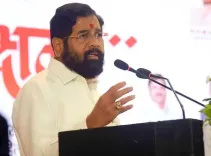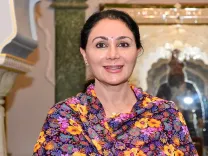Why is US lawmaker Sydney Kamlager-Dove Criticizing President Trump's Stance on India?

Synopsis
Key Takeaways
- Kamlager-Dove's criticism of Trump's India policy reflects a broader concern for US-India relations.
- The letter signed by 19 Democratic lawmakers emphasizes the need for a reset in ties.
- The H-1B visa process and tariffs are central issues affecting collaboration.
- There is bipartisan recognition of the significance of the US-India partnership.
- Kamlager-Dove calls for strategic engagement to promote mutual interests.
Washington, Oct 9 (NationPress) Sydney Kamlager-Dove, the Democratic Congresswoman from California and the Ranking Member of the Subcommittee on South and Central Asia, has described the Trump administration's policy towards India as "incredibly unfortunate" and has called for a stronger partnership with New Delhi.
In an exclusive interview with IANS, Kamlager-Dove discussed the lack of response from Republican lawmakers concerning India-US relations, emphasized the need for bilateral cooperation for US national interests, and addressed the recent issues surrounding the H-1B visa program.
Here are key excerpts from the interview.
IANS: Recently, 19 Democratic lawmakers, including yourself, sent a letter to President Trump urging a reassessment of ties with India. What motivated this letter, and are you surprised by the absence of Republican signatures?
Kamlager-Dove: As the ranking member of the South and Central Asia Subcommittee, I believed it was vital for my name to be included in that letter, serving as a reminder to the President and this administration about the significance of the US-India relationship. We need to highlight the consequences these tariffs have on our progress.
The tariffs are hindering various legislative initiatives that we are interested in, as well as delaying critical Quad leadership summit meetings, which are essential. I've also introduced an amendment urging President Trump to participate in these summits.
The tariffs disproportionately affect our ability to collaborate, which is deeply unfortunate, especially considering the substantial groundwork laid by the Biden administration to enhance this bilateral relationship.
President Trump was presented with a valuable opportunity but has opted for erratic, xenophobic, and punitive policies that alienate our allies. It’s disheartening to see a President being harsh towards his partners while being accommodating towards adversaries.
I'm disappointed by the absence of Republican support for this letter, although I’m not surprised given their hesitance to speak candidly about Trump. It’s ironic that during the Biden administration, Republicans praised the importance of US-India relations and urged us to strengthen them, yet now we find ourselves in this situation.
Democrats must take on the responsibility of reminding both the American public and international communities about our commitment to fostering meaningful international relationships and enacting supportive, strategic policies, in stark contrast to what we've seen from this administration.
IANS: Over the past 25 years, the US and India have established a robust bipartisan partnership, especially under the Biden administration. Do you believe the current shift is a reflection of Trump's personal policies rather than an official US stance?
Kamlager-Dove: I cannot support the current administration’s policies. The H-1B visa process has become an arbitrary lottery, almost akin to a bribe.
Paying $100,000 for an H-1B visa instead of engaging in meaningful discussions about reform is detrimental to the United States, which relies on global talent for competitiveness. How can we attract innovators worldwide with such policies?
Why must we urge a President to attend a Quad Leadership Summit? This summit is crucial for unity among our partners in the Indo-Pacific. We need to understand the importance of these relationships rather than imposing arbitrary tariffs without clear justification, which negatively affects US jobs and manufacturing, hindering our progress.
Currently, the only opposition to these policies is coming from Democrats, while Republicans remain silent or complicit in measures that are creating significant setbacks.
IANS: You've consistently supported a strong US-India relationship. In your speech on September 8, you mentioned that President Trump imposed a 50% tariff on India due to his "fragile ego." Can you elaborate on the reasoning behind his anti-India stance?
Kamlager-Dove: I cannot speculate on the President's motivations.
The relationship with India has been one of our most significant partnerships. I represent the 37th congressional district, which is home to a vibrant and diverse community, including one of the largest Indian American populations in the country.
I feel a responsibility to highlight the strategic importance of this region and the potential for a robust bilateral relationship with India. This is why I spoke out, signed the letter, and proposed an amendment regarding the Quad Leadership Summit. I raised these concerns during discussions with ambassadors from the Quad countries, directly addressing Trump's actions towards India.
While I cannot understand his motivations, I hope he realizes the setbacks he is causing. India is set to host an AI summit in February, and the United States should be involved in these discussions, as India's innovation and expertise are critical for advancing AI technologies.
I fail to comprehend why a President would want to undermine such opportunities. I also believe there are consequences; the US has been interested in the civil nuclear liability law currently being discussed in the Indian Parliament, which may have stalled due to the White House's actions.
IANS: What repercussions could a hostile India policy have for US interests, particularly in South Asia and the broader Indo-Pacific region?
Kamlager-Dove: Upon assuming my role as the South and Central Asia Subcommittee ranking member, I engaged in insightful discussions with our former Ambassador to India, Eric Garcetti. We explored the country’s potential across various sectors including technology, manufacturing, Bollywood, and defense technologies. We discussed the importance of having strong allies in the region, especially in relation to monitoring China.
We risk losing out on numerous opportunities due to these arbitrary policies affecting the H-1B visa program, especially the $100,000 fee, which will disproportionately impact the Indian community, who constitute about 70% of all H-1B visa recipients.
These individuals are highly skilled and in high demand. If we restrict their entry, we could face a shortage of talent in crucial industries like medicine, entertainment, and business, which are vital for both my district and the nation. We need more discourse around this issue and a concerted effort to combat the xenophobia that fuels such policies.
IANS: Congresswoman Deborah Ross recently mentioned in an interview with IANS that Prime Minister Modi meeting with Presidents Xi Jinping and Putin at the SCO Summit in China indicates that India has options. Some analysts argue that India's measured response to Trump's criticisms demonstrates strategic maturity. What are your thoughts on India's engagement with both Russia and China, and its management of relations with the US during this time?
Kamlager-Dove: It illustrates the consequences of being lenient towards adversaries while being unkind to partners.
I can’t fault India for reminding the United States of what is at stake. India has a duty to its citizens to ensure resilience, which sometimes entails forging connections with nations that are not necessarily our allies. I believe we have the potential to establish a deeper, more authentic relationship with India than with China or Russia, which often operate on a transactional basis. However, I cannot criticize India for taking necessary steps to secure its growth.
Maintaining relationships requires continuous effort. I'm concerned that the current cooling of US-India relations could become permanent, which would be detrimental to all involved and to the region as a whole. We must encourage our leaders to maintain dialogue.
IANS: India recently joined forces with China, Pakistan, Afghanistan, and Russia in opposing Trump's desire to reclaim Bagram Air Base in Afghanistan. What is your reaction?
Kamlager-Dove: It’s interesting that a President who advocates for isolationist foreign policies is simultaneously engaging in encroachment. It’s perplexing that these countries have united to push back.
Because of Trump's approach, we are actively isolating ourselves from partners that would typically want to collaborate with us.
IANS: Under the Biden administration, India was central to the US Indo-Pacific strategy and was viewed as a counterbalance to China. Do you believe the inconsistent China policy of the Trump administration has strained ties with New Delhi?
Kamlager-Dove: In many congressional hearings I attend, Republicans often assert that we must confront China, labeling it as the enemy. They argue that we are allowing China to gain an advantage.
However, we have not conducted any hearings focused on substantive policy discussions that would effectively counter Chinese aggression against our allies and in areas where we have historically had a presence.
There were numerous opportunities to demonstrate our strength and push back against China, yet Republicans have remained silent. The Trump administration has dismantled essential safeguards and has failed to adequately fund or support them. Therefore, when I hear Republicans proclaim the necessity of being tough on China, those statements ring hollow.










